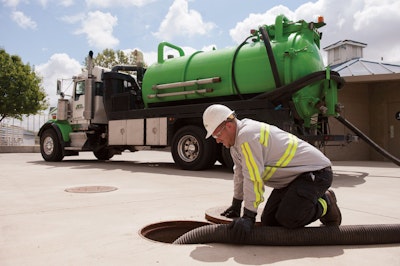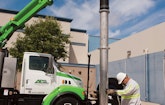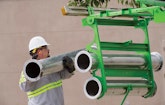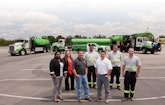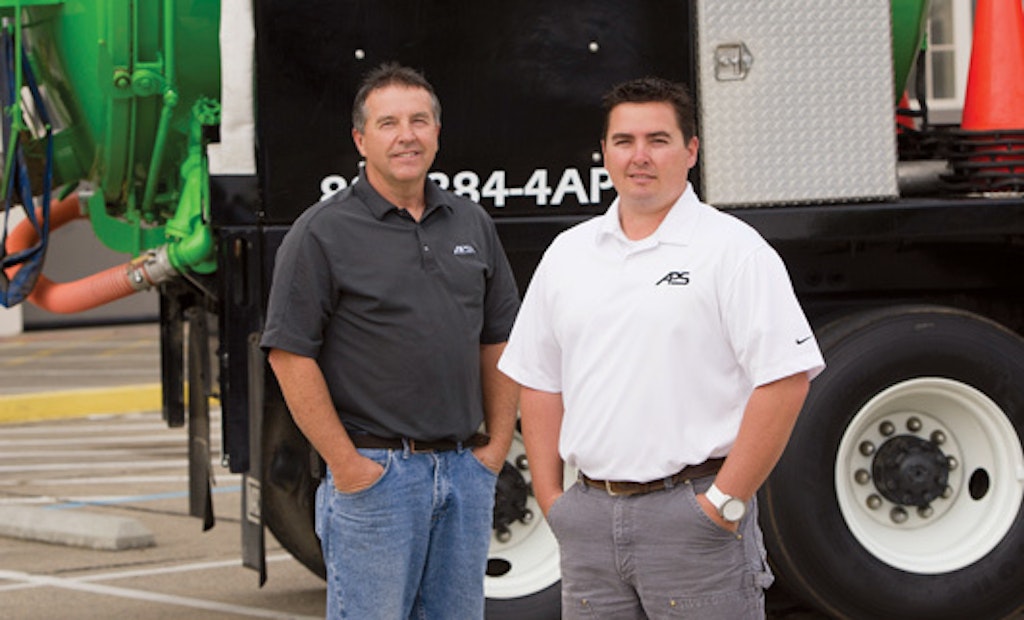
Interested in Industrial?
Get Industrial articles, news and videos right in your inbox! Sign up now.
Industrial + Get AlertsBryan Hage’s first service call as a small business owner showed his willingness to learn new skills and overcome any obstacle. The 21-year-old entrepreneur spent five hours married to a shovel trying to locate the septic tank after the homeowner gave him a false lead. When he finally found the lid for the 2-foot-deep tank on the other side of the property, Hage felt so bad about his performance that he gave the owner a discount.
“I’d never pumped a septic tank in my life, but I knew everything about vacuum trucks from working in my parents’ portable restroom company,” says Hage, who opened APS (Advantage Pumping and Septic) Environmental in North Highlands, Calif., in 2003. Soon thereafter, Hage became certified as a vacuum truck technician through the National Association of Wastewater Technicians and he’s been expanding his knowledge base to serve customers ever since.
Hage’s philosophy of accepting work, then figuring out how to do it, more than doubled his annual revenue every other year until 2008. As the company expanded into pumping commercial, industrial and municipal stormwater, Hage also built a private wastewater treatment plant, branched into portable sanitation and bought a carwash pumping company.
INVESTING IN THE FUTURE
“I dumped every penny I had back into the business for the first seven years,” says Hage. “I drew a salary, but I rarely took out money for personal use. My satisfaction came from buying equipment with cash from projects turned down by other contractors.”
Today, the environmental company services a 200-mile radius covering central and northern California. Pumping grease accounts for 15 percent of annual revenue, septic 10 percent, carwashes 25 percent, stormwater 20 percent, pipeline cleaning and inspections 25 percent, and hydroexcavating 5 percent. The company’s 10 employees communicate via smartphones and all the trucks are equipped with GPS technology.
Hage was born to pump. As a toddler, he spent time riding along on routes with his grandfather, who owned a portable sanitation and septic pumping business. Later, his parents, Steve and Gayle Hage, bought the restroom side of the business and young Bryan remained by their side until they sold Chuck’s Portable Services when he was 18.
“There is no better experience than working next to one’s parents,” says Hage, 31. “I always knew I was going to be a small business owner, and they groomed me for it every day.”
Hage married Heidi Fiedler in November 2002, then opened his business the following April. He chose septic work because start-up expenses were less than in portable sanitation. With $10,000 of his own money and a $5,000 loan from his father, Hage bought a 2,500-gallon stainless steel vacuum tank with Masport HXL40 pump.
ADDING EQUIPMENT
“We modified it into a roll-off tank to fit on one of Dad’s roll-off trucks,” says Hage. “I rented it from him whenever I had a service call.”
Under this arrangement, Hage grew the business without overhead. Within a year, he was making $20,000 monthly pumping septage and grease, leading Heidi to leave her full-time job and run the home office. “I was putting in 100-hour weeks because we were open around the clock,” says Hage. “Seeking recommendations from other business owners and trial-and-error experiences taught me how to do things.”
Soon Hage had enough cash to buy a 2003 Kenworth T300 chassis. He mounted the modified vacuum tank on it, painted the truck his company’s signature Kawasaki green, hired a driver and they split the work hours. They offloaded commingled septage and grease – a practice recently prohibited – at Inviro-Tec Disposal, a private wastewater treatment plant, and at the Sacramento Regional Wastewater Treatment Plant. The company pumped 500,000 gallons in 2004.
With the septic business on solid footing, Hage bought 55 Tufway restrooms from Satellite Industries in 2005. He added a 300-gallon water tank to the vacuum truck so it could do double-duty. The move prompted his semi-retired father to invest in the business as a copartner that year.
Construction companies Chuck’s Portable had serviced welcomed their return. “Then Gemma Power Systems requested 45 units for the power plant they were building in Roseville,” says Hage. “Twice a week, we pumped them plus 4,000 gallons from holding tanks servicing their modular offices. That huge break generated a lot of revenue really fast.”
WASTEWATER PLANT BECKONS
A year later, the partners spent the profit on a 2005 Isuzu chassis and built a portable restroom truck carrying four units, a 150-gallon water tank and a 350-gallon waste tank. Despite hiring a driver, father and son couldn’t resist occasionally running the routes, and soon they had 220 units rented with requests for more.
“The next step was buying 100 more restrooms and another truck,” says Hage. “The move would marry me to the business and I didn’t want that.” He sold the restroom side of the business and used the money to build AquaTec, a private wastewater treatment plant that enabled Hage to pump stormwater from construction sites and municipalities.
“We were receiving numerous calls for the service, but the Sacramento treatment plant wanted just domestic waste,” he says. “The only plant accepting stormwater was in Oakland 100 miles away.”
With sights set on diversification, the Hages attended trade shows to learn about dewatering equipment and toured a private plant in Arizona. Then the partners designed their plant and Sacramento County approved the plans. The 3,000-square-foot facility took a year to permit and build. It opened in 2007.
Haulers offload into a Muffin Monster grinder (JWC Environmental) that removes inorganics and homogenizes the load; then it’s pumped into two 30,000-gallon mixing tanks. When a batch is ready to dewater, sludge flows to a two-channel rotary fan press (Prime Solution Inc.) with a metering pump and polymer feed/blend system. Filtrate is stored in six 8,000-gallon tanks and time-dosed to the sewer, while cake at 17 to 22 percent solids goes to a landfill.
“We processed 250,000 to 300,000 gallons per month,” says Hage. “Because we were a small operation, we limited usage to ourselves and other companies that took care of our customers while we were on vacation.”
MIGRATING TO THE WEB
Hage also branched into carwash pumping in 2007. Then he bought Thrifty Rooter’s carwash division from Bill Artamenko, owner of Inviro-Tec. Hage bought a Barringer wet/dry vacuum truck with 2,650-gallon carbon steel debris tank and 500-gallon freshwater tank from Keith Huber to handle the added work. “That kick-started us into major vacuum loading and pipeline-cleaning jobs,” Hage recalls.
To attract business beyond the Sacramento area, Hage launched a website focused on commercial, industrial and municipal markets, and listed services he didn’t yet offer to open doors. “I said yes to every job, and used whatever equipment I had,” he says. “Customers never questioned the rig as long as it achieved the desired results.” If a bigger machine would have made the work go faster, Hage discounted his time, then bought the proper equipment when he had the money.
The 2008 economic collapse created new challenges. Hage bailed out of septic service, and went without a salary that year to retain his employees. He also faced continuing odor problems at AquaTech.
Rather than invest hefty sums into odor control, Hage approached competitor Artamenko and suggested a merger. Artamenko agreed and Hage moved his equipment into Inviro-Tec’s building. The combined plant, operated by Steve Hage, processes 800,000 gallons a month from all haulers.
TOUGH JOBS ABOUND
A major break came when an environmental company subcontracted APS to excavate 120 cubic yards of 3/4 stone used to filter stormwater at AeroJet, a space and defense contractor. Four workers ran the wet/dry vacuum truck nonstop for 16 hours, dumping the gravel onsite. That job led to other work like cleaning storm drains and pipelines.
One such pipe-cleaning project involved jetting the 6-inch drainage systems running under the spillway gates of three hydroelectric dams. Hage rented a crane and trailer-mounted jetter, then hoisted the machine on top of the spillways. The work took five days, and Hage spent the profits buying a trailer-mounted 4,000 psi/18 gpm jetter from US Jetting.
Rainstorms, however, made the phone ring. During expansion of Folsom Dam, the stormwater contractor hired APS to remove 350,000 gallons of runoff in three days from 30 20,000-gallon Baker tanks. “The construction permit limited road travel from 9 a.m. to 3 p.m.,” says Hage. “To meet the deadline, I ran my three trucks and subcontracted with other companies for five more trucks with operators. The coordinated effort was another huge financial break.”
GOING BIG
As commercial and residential stormwater accounts grew, workers usually serviced the vaults with the wet/dry truck, but it made the work hard and take longer than needed. After acquiring another municipal customer to justify the purchase, Hage bought a 2002 Vac-Con V309LHA/1000 combination sewer cleaner from Municipal Maintenance Equipment.
With the Vac-Con machine, Hage improved the company’s ability to provide stormwater collection and municipal pipeline cleaning. “We have a MyTana push camera system for inspecting 3- to 8-inch pipes, and subcontract mainline inspections,” he says. “My next major purchase will be an inspection system, because never turning down a job will always open the door to unlimited opportunities.”
